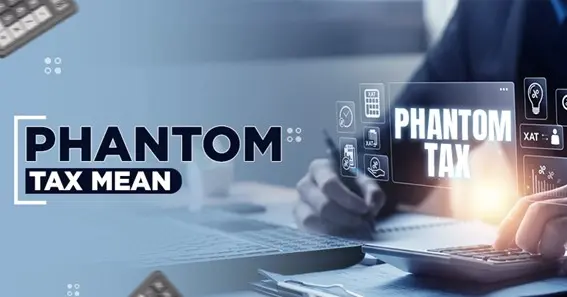What is phantom tax? Phantom tax, also called “phantom income” or “dry income,” is a confusing way to think about how to tax assets. People who own things must pay taxes on gains or income, which they still need to turn into cash.
This event can significantly impact investors’ tax implications, financial planning options, and overall investment plans. It can also affect many different types of investments. Here we discuss about what is phantom tax, and how it work:
What Is Phantom Tax?
Phantom tax occurs when people who own stocks have to report and pay taxes on gains they recognize, even if they have yet to sell the investment or cash out the profits. The Internal Revenue Service (IRS) requires this tax to ensure that all investment income is reported correctly yearly, even if it comes in cash.
Phantom tax occurs when individuals owe taxes on non-cash or “paper” gains—often through pass-through entities—resulting in a tax obligation without receiving actual cash.
Process Of Phantom Tax Work
Investors are charged on gains that have yet to be recognized or on income that has not been received in cash. This is called a “phantom tax.” Some examples are stocks with “accrued value,” real estate with “depreciation,” zero-coupon bonds with interest that builds up every year, and mutual funds that reinvest earnings. As we already know what is phantom tax now explore the working process:
Unrealized Stock Gains:

It happens all the time with stocks. People who buy stocks that increase in value over time and then don’t sell them lose their money. These gains don’t give owners any cash, but they have to report them yearly and may have to pay taxes on them to the government.
Zero-Coupon Bonds:
Since zero-coupon bonds are worth less than their face value, they don’t pay interest regularly. Instead, they gain interest every year, but buyers don’t get any cash until the bond matures. Whether investors get cash or interest, they still have to pay taxes on it every year.
Mutual Funds and Reinvested Dividends:
Many mutual funds don’t give owners cash when they get dividends or capital gains. Instead, they instantly reinvest the money into more shares. Even though investors have yet to get any cash, they still have to pay taxes on the money they put into the business. The name for this is “phantom income.”
Implications Of Phantom Tax
Phantom tax changes investors’ tax responsibilities, cash flow, tax planning, and retirement plans, among other things. Here discuss about what is phantom tax implications:
Tax Liabilities:
After reading the above you must know what Phantom tax means Phantom tax can catch buyers off guard by making them pay taxes they didn’t plan to. Investing pros should set aside cash to cover taxes on unearned gains or income, even if their assets still need to make their money. It can be hard to plan for long-term purchases when money is tight.
Problems with Cash Flow:
People with ghost income may need to sell some of their investments or find other ways to pay their taxes because it doesn’t turn into real cash. For instance, investors may have to sell assets or see gains or losses happen faster than planned, which might not fit their long-term investment plans.
Retirement Planning Issues:
Phantom tax can be very annoying for people who are preparing to retire or have already retired. If a big part of their investments brings in “phantom income,” it might be harder for them to get the money they need for retirement. This might mean they need to change how they plan to make money in retirement or find other ways to make money.
Strategies for Managing Phantom Tax
Ghost tax is hard to understand, so you need to think ahead and pick suitable options. Investing in low-tax stocks, spreading out your investments, using tax-loss harvesting, and getting professional help with tax planning and filing are all excellent ways to handle your money. Below we discuss about what is phantom tax strategies for managing Phantom tax:
Tax-Advantaged Savings Accounts:
Funding tax-advantaged accounts like Roth IRAs, 401(k) plans, or individual retirement accounts (IRAs) can help the ghost tax work less against you. By putting money into these accounts that grow tax-deferred or tax-free, investors can avoid or lower the taxes they have to pay now on unearned gains.
Tax-Efficient Investment Strategies:
Phantom tax can be less of an issue if you spend in ways that minimize your tax bill. To do this, pick investments that give you less fake income, like low-turnover index funds or tax-free local bonds. Owners can better meet their tax responsibilities if they cut down on the number of taxable events.
Tax-Loss Harvesting:
Tax-loss harvesting is a strategy where investors sell investments that have lost money to balance out investments that have made money. Investors can use ghost income to pay less taxes and save money simultaneously. You should follow all tax laws and rules to get the most out of this method.
Conclusion
Phantom tax is challenging for companies since it changes their tax responsibilities and investment plans. Investors can fulfil their financial goals and avoid ghost taxes by using tax-advantaged accounts, low-tax investments, diversification, tax-loss harvesting, and professional guidance. In the above, we discuss what phantom tax is and dive into more.
FAQ
What exactly does “phantom tax” mean?
You must pay phantom tax on gains from stocks, which you still need to turn into cash.
What does the “ghost tax” mean for investors?
It can be difficult to plan your cash flow, avoid unexpected tax bills, and figure out how to earn money in retirement.
What kinds of companies are most likely to have silly taxes?
Common examples are real estate with reductions for depreciation, stocks with unrealized gains, and bonds with interest that isn’t due until later.
What can buyers do to get the ghost tax going down?
Use tax-advantaged accounts that save you money on taxes, spread out your investments, think about tax-loss harvesting, and talk to a professional.
Why does the IRS tax money that doesn’t exist?
To ensure that all income, even gains that have yet to be realized, is recorded and taxed every year in a way that is fair and consistent with tax rules.
Sources:
https://www.incommtax.com/what-does-phantom-tax-mean/
https://www.investopedia.com/terms/p/phantom-income.asp
https://www.incommtax.com/what-does-phantom-tax-mean/
We have covered all the below topics in the above article
Tax liability
Imputed income
Taxable income
Non-cash income








